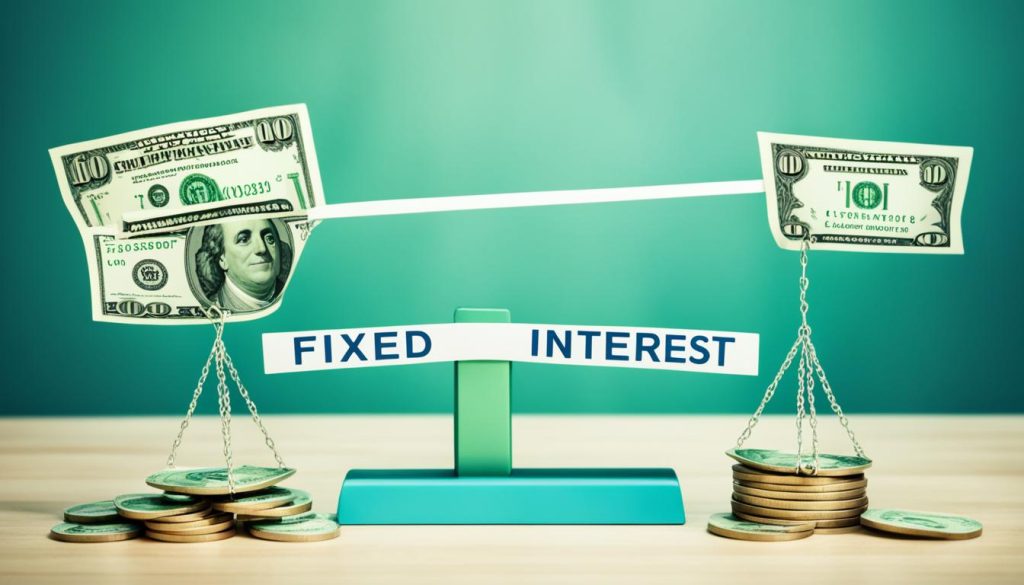When you’re looking at personal loans, deciding between fixed or variable interest rates is key. Each option has its pros and cons. It’s important to know the differences before you decide1. Getting a good interest rate on your loan can really affect how much you pay back. This is because lower rates mean smaller monthly payments and less interest over time. Things like the current market rates, your credit score, and the loan term affect the interest rate you get.
Key Takeaways
- Average personal loan interest rates are currently around 12.10%, significantly lower than average credit card interest rates, which currently stand at 27.94%1.
- If you take out a $20,000 personal loan with a fixed 12.10% interest rate over five years, monthly payments will be approximately $445.90, totaling $6,754.02 in interest over the loan duration1.
- Personal loans are typically fixed-rate loans, with variable-rate personal loans being less common1.
- Interest rates for fixed-rate loans range above 10%1.
- Variable-rate personal loans may have lower initial interest rates, such as Fed plus 6%, subject to readjustments based on benchmarks or indices1.
Understanding Interest Rates for Personal Loans
Personal loan interest rates are key to knowing the total cost of borrowing. They can go from as low as 3% to as high as 36%, based on different factors2. Getting a good interest rate is important because it affects your monthly payments and the total you’ll pay back.
Factors Affecting Personal Loan Interest Rates
Several factors affect the interest rate on a personal loan. Your credit score, the loan term, and market conditions are all important. People with high credit scores usually get lower rates2. Those with lower scores might pay more because they’re seen as riskier2. Short-term loans also tend to have lower rates than long-term ones2.
The Importance of Securing a Good Interest Rate
Getting a good interest rate on a personal loan is key. It can make your monthly payments and total repayment amount smaller. On the other hand, a high rate means higher payments and more money paid over time2. Knowing what affects rates and looking for the best deal helps you get a loan that fits your budget and goals.
“Securing a good interest rate on your personal loan is essential, as it can significantly impact the overall cost of borrowing and your monthly payments.”
https://www.youtube.com/watch?v=wkscvZNauJU
| Factors Affecting Interest Rates | Impact on Interest Rates |
|---|---|
| Credit Score | Borrowers with excellent credit scores typically receive lower interest rates2. |
| Loan Term | Shorter-term personal loans generally have lower interest rates compared to longer-term loans2. |
| Market Conditions | Interest rates for personal loans may vary based on market conditions2. |
Understanding what affects personal loan interest rates and getting a good rate can make borrowing better. It helps you reach your financial goals more effectively342.
Fixed Interest Rates: Stability and Predictability
Fixed interest rates are a great choice for those who want stability and predictability in their loans. Unlike variable rates, which can change, fixed rates stay the same throughout the loan’s life. This lets borrowers plan their money better with confidence5.
Benefits of Fixed Interest Rates
- Consistent monthly payments: With a fixed rate, your monthly loan payment will stay the same. This makes budgeting easier and avoids surprises6.
- Protection against rate increases: Fixed rates keep you safe from rising interest rates, protecting you from market changes6.
- Simplicity and peace of mind: Knowing the fixed rate can make you feel secure. It lets you focus on your financial goals5.
Drawbacks of Fixed Interest Rates
- Higher initial rates: At the loan’s start, fixed rates are usually higher than variable rates6.
- Missed opportunities: If rates go down, you won’t get the lower rates during the fixed period6.
- Prepayment penalties: Many fixed-rate loans have big penalties if you pay off the loan early or refinance6.
Fixed interest rates might not let you save money like variable rates do. But, they are a steady and predictable choice for those who value stability and security5.
“The stability and predictability of fixed interest rates can provide peace of mind and allow for more effective financial planning.”
Choosing between fixed and variable interest rates depends on your financial situation, how much risk you can handle, and your goals. Think about the pros and cons of each option to make a choice that fits your needs and likes5.
Variable Interest Rates: Flexibility and Potential Savings
Variable interest rates on personal loans can be a big help. They can change based on the market, which means you might pay less if rates go down7. This flexibility can lead to savings on your monthly payments7.
At first, these loans often have lower interest rates than fixed-rate ones7. But, there’s a catch. If rates go up, your payments could increase too7. This might be hard for people who like to budget their money closely.
Thinking about getting a variable-rate loan? You should know the good and bad parts7. Think about how you handle risk, your financial goals, and what interest rates are doing7. Talking to a financial expert can help you make a choice that’s right for you7.
Variable-rate loans can save you money if rates drop, but they can cost more if they go up7. It’s important to think about what’s best for your money and future plans7.
| Benefits of Variable Interest Rates | Drawbacks of Variable Interest Rates |
|---|---|
In conclusion, variable-rate loans have their ups and downs. It’s important to think about your money situation, how you handle risk, and your future goals7. Knowing the good and bad can help you make a choice that fits you7.
Personal Loans: Fixed vs. Variable Interest Rates
Choosing the Right Interest Rate Option
Choosing between a fixed or variable interest rate for personal loans is crucial for your finances8. Fixed-rate loans keep the same rate throughout, while variable-rate loans can change with the market8. Fixed-rate loans often have a steady rate, and variable-rate loans start with a lower rate but can go up8.
Assessing Your Risk Tolerance and Financial Goals
When picking a personal loan rate, think about your risk level and financial goals3. Variable-rate loans might start lower but could go up, while fixed-rate loans offer steady payments at a possibly higher rate3.
Look at your credit score, loan length, and how you handle rate changes3. If you’re okay with risk, variable-rate loans might be for you. But if you want stability, fixed-rate could be better2. Choose what fits your situation and financial plans2.
It’s key to know the details of each option, like rate change limits for variable loans8. Think about what you need and make a choice that helps you financially2.
“The decision between fixed and variable interest rates depends on individual circumstances and risk tolerance.”
| Fixed Interest Rates | Variable Interest Rates |
|---|---|
| Consistent monthly payments | Potential for lower initial rates |
| Predictable interest costs | Possibility of rate fluctuations |
| Ideal for those who value stability | Suitable for borrowers with higher risk tolerance |
Comparing Loan Offers and Lender Options
When looking for a personal loan, it’s key to check out offers from different lenders. This helps you find the best interest rate and terms. Your credit score and how creditworthy you are greatly affect the interest rate you get. Higher scores usually mean lower rates9.
Lenders look at your credit history, income, and debt-to-income ratio to judge your creditworthiness9.
The Role of Credit Score and Creditworthiness
For personal loan approval, lenders often want a credit score between 620 to 7009. Loan origination fees can be from 0.00% to 9.99% of the loan, and terms can be 12 to 84 months long9. Knowing how your credit score impacts your loan options can help you get a better interest rate, whether it’s fixed or variable.
| Lender | Loan Amounts | APR Range | Funding Time |
|---|---|---|---|
| SoFi | $5,000 – $100,000 | 8.99% – 25.81% | Same-day |
| Discover | $2,500 – $40,000 | 7.99% – 24.99% | 1 day |
| Upgrade | $1,000 – $50,000 | 8.49% – 35.99% | 1 day |
| Rocket Loans | $2,000 – $45,000 | 9.12% – 29.99% | Same-day |
| PenFed Credit Union | $600 – $50,000 | 7.99% – 17.99% | 1 day |
APRs for personal loans can be from 7.99% to 35.99%, based on the lender9. Some lenders don’t share their minimum credit score needs9. By looking at different lenders, you can compare offers to find one that suits your financial goals and risk level.
Understanding your credit score and creditworthiness is key when comparing personal loan offers and exploring lender options. Researching and comparing lenders can help you get the best terms for your loan needs91011.
Conclusion
Choosing between a personal loan with a fixed or variable interest rate is a big decision. It can greatly affect your financial future12. Fixed rates give you stability and let you plan your budget better, avoiding the ups and downs of variable rates13. Variable rates, however, offer flexibility and could save you money if the market is good12.
It’s important to think about your own situation, how much risk you can handle, and your financial goals12. Look at things like market trends, your loan type, and how long you plan to borrow12. By looking at different loan offers and understanding the pros and cons of each rate type, you can pick the best option for you.
The choice between fixed or variable interest rates should be based on what you really need and want financially12. Making a smart choice can help you reach your financial goals and secure a stable financial future14.
FAQ
What are the key differences between fixed and variable interest rates for personal loans?
What factors affect personal loan interest rates?
Why is securing a good interest rate important for a personal loan?
What are the benefits and drawbacks of a fixed interest rate personal loan?
What are the advantages and disadvantages of a variable interest rate personal loan?
How do I choose between a fixed or variable interest rate personal loan?
How does my credit score and creditworthiness affect my personal loan interest rate options?
Source Links
- Are Personal Loans Fixed or Variable? | MoneyLion
- Fixed vs. Variable: Choosing the Right Personal Loan Rates
- Fixed and Variable Rate Loans: Which Is Better?
- Fixed Interest Rate: Definition, Pros & Cons, vs. Variable Rate
- Asset-Based Loans: Variable vs Fixed Rates
- Fixed vs Variable Mortgage Rate: How To Choose – NerdWallet Canada
- Fixed vs Variable Rate Personal Loans | Choose Better Flexibility
- Fixed vs Variable – Understanding Rate Types
- How to Compare Personal Loans From Different Lenders
- Fixed-Rate Vs. Variable-Rate Loans | Quicken Loans
- How to compare loan offers to get the best deal for you
- The Difference Between Variable vs Fixed Rates
- Fixed vs. Variable Interest Rates | Capital One
- The Choice Between Fixed and Variable Rate Loans – Growth Corp


